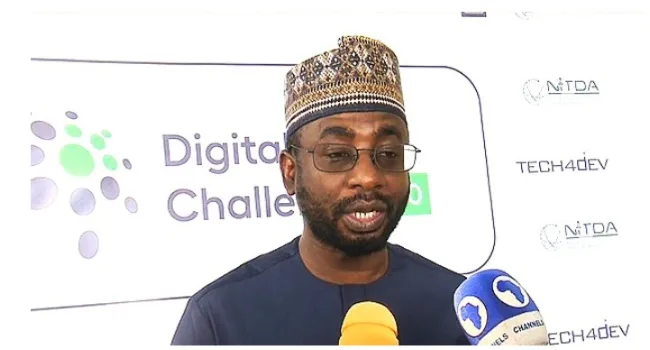The Federal Government has unveiled an ambitious plan to achieve 95% digital literacy among Nigerians by 2030, with a specific goal of training and empowering at least 30 million citizens by 2027.
The announcement was made on Thursday in Abuja at the grand finale of the Tech4Dev Digital for All Challenge 2.0, by the Director-General of the National Information Technology Development Agency (NITDA), Kashifu Abdullahi, who was represented by the agency’s Director of Stakeholder Management, Aristotle Onumo.
Abdullahi emphasized that NITDA is spearheading this initiative through strategic partnerships, particularly with the National Youth Service Corps (NYSC) and educational institutions nationwide. He said, “The DFA 2.0 competition aligns with NITDA’s vision to ensure that by 2030, 95% of Nigerians are digitally literate. By 2027, we aim to have 30 million Nigerians trained and digitally empowered. We cannot achieve this alone, which is why we are collaborating with key partners.”
Highlighting the role of NYSC, Abdullahi noted that the agency is training corps members as Digital Literacy Champions, who are deployed across all local government areas to train citizens. “Currently, Digital Literacy Champions are active in every local government area of Nigeria, with real-time data on the number of Nigerians trained accessible through our portal,” he explained.
Additionally, Abdullahi revealed that NITDA, in collaboration with the Ministry of Education, has successfully integrated digital literacy into the national curriculum at all educational levels. “Digital literacy was recently launched as part of the curriculum for primary, secondary, and tertiary institutions. For example, at Nasarawa State University, digital literacy is embedded in the General Studies programme. By the end of their first year, students are certified by Cisco, equipping them to participate fully in the digital economy,” he added.
Abdullahi also outlined that digital literacy is now a compulsory component for promotion examinations among civil servants, reinforcing the government’s commitment to improving service delivery and efficiency. “For civil servants, digital literacy has become a key requirement for career progression. This step is part of our broader effort to create a digitally literate nation by 2027,” he stated.
He commended Tech4Dev for its partnership in this initiative, describing the Digital for All Challenge as a “shared vision.” “We believe digital literacy is the new currency of the 21st century. With the right digital skills, we are laying the foundation for innovation, job creation, and sustainable prosperity. Partnerships like this are crucial because 400 NITDA staff cannot reach 270 million Nigerians,” Abdullahi remarked. He also encouraged participants to view the competition as a transformative opportunity, not just a contest.
“This competition is not merely a contest but a tool for transformation. The young innovators we celebrate today are embracing digital skills as instruments for empowerment and nation-building. The future is not something we wait for; it is something we create through knowledge, collaboration, and courage,” he said.
In her remarks, Nkeiruka Onyejeocha, Minister of State for Labour and Employment, reaffirmed the government’s commitment to advancing digital literacy as a catalyst for both job creation and national development. She urged more young people to actively engage in initiatives like Tech4Dev.
Idongesit Udoh, the UK International Development Digital Access Programme Adviser and Africa Cyber Programme Country Lead, also lauded the initiative, calling the Digital for All Challenge a “landmark project” that has expanded digital skills across the country. “Skills, connectivity, and trust are the foundations of a modern digital economy, and this initiative has significantly advanced all three,” Udoh said. He further emphasized the competition’s role in creating global competitiveness and advancing opportunities for youths, civil servants, and emerging leaders.
Co-founder of Tech4Dev, Oladiwura Oladepo, highlighted the profound impact of the Digital for All Challenge, noting that the first edition directly benefited nearly 18,000 Nigerian youths. “The second edition was designed to deepen digital literacy, empower individuals, and unlock opportunities for Nigerians across diverse groups, ages, and classes,” Oladepo explained. She noted the competition’s diverse categories, which included K-12 learners aged 8-18, the Youth Basic and Intermediate categories covering fields such as cybersecurity, product design, data analysis, digital marketing, and software development, and a Civil Servants category aimed at enhancing digital capacity among government workers.
“This programme has impacted Nigerians at all levels, equipping them with the skills needed to thrive in a technology-driven world. Today, I am proud to say we have come a long way in fulfilling this vision, having reached over one million Nigerians through awareness campaigns, training sessions, assessments, and competitions,” Oladepo said.
The competition featured participants from all six geopolitical zones of the country. The winners received substantial cash prizes, with the overall winner, Miracle Michael, taking home ₦15 million. The second prize of ₦12.5 million went to Chinedu Arisa, while Ismail Adam and Uluchi Chibueze received ₦10 million and ₦7.5 million, respectively.


